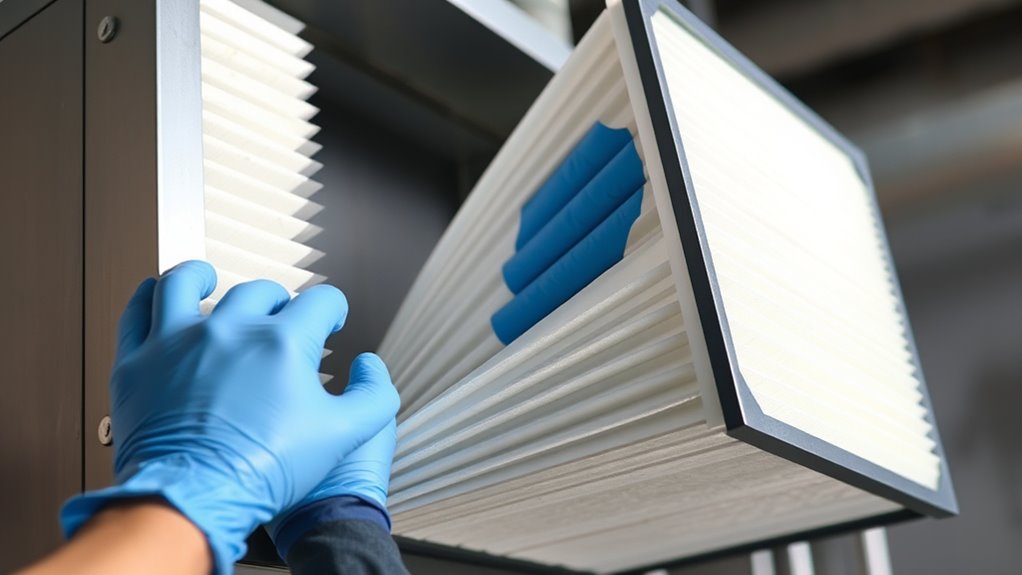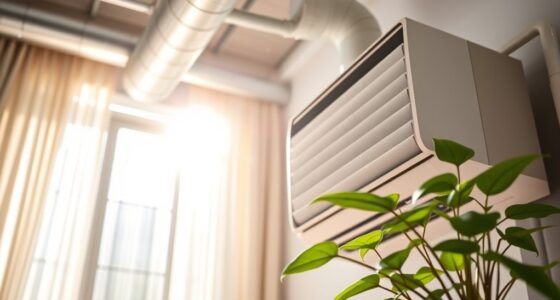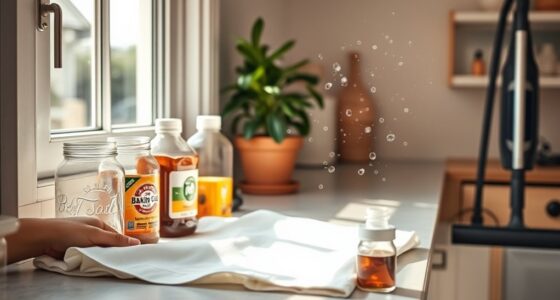Believing HEPA filters never need replacing or last forever without maintenance can cost you money and harm indoor air quality. Skipping scheduled replacements, thinking cleaning is enough, or ignoring signs of wear diminishes filter effectiveness and increases energy bills. Proper storage and careful handling also matter, as damaged filters require early replacement. Staying aware of these myths helps you save money and ensure healthier environments—keep going to discover more about proper HEPA filter care.
Key Takeaways
- Believing HEPA filters never need replacement leads to decreased air quality and higher health risks.
- Assuming filters last forever without maintenance causes efficiency loss and increased energy costs.
- Ignoring regular replacement schedules results in clogged filters, system strain, and costly repairs.
- Thinking cleaning alone suffices can leave residual pollutants, reducing filter effectiveness and increasing expenses.
- Overlooking signs of filter wear causes indoor air issues and premature filter replacements, costing more over time.
Believing HEPA Filters Never Need Replacing
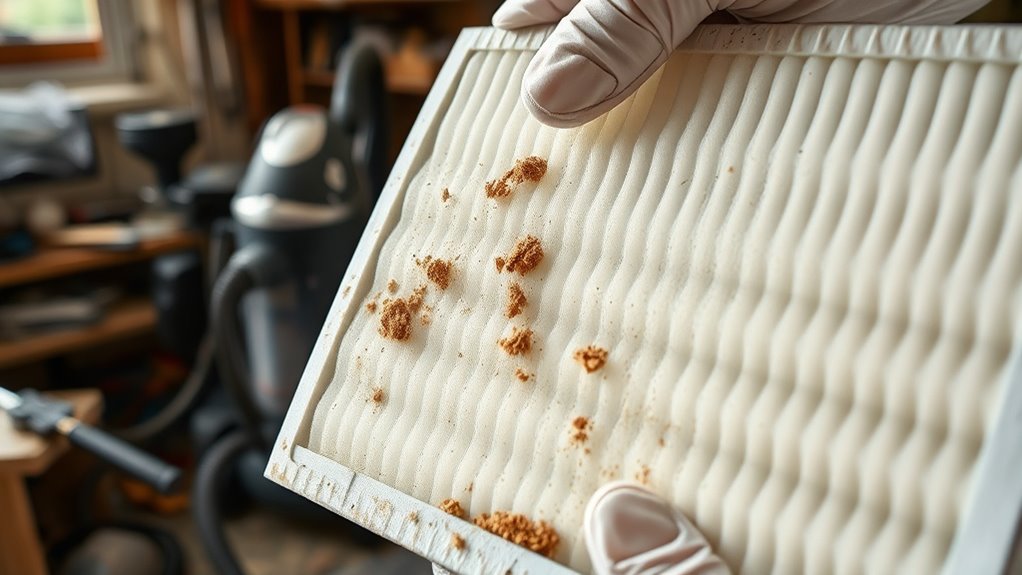
Many people believe that HEPA filters never need to be replaced, but this is a misconception. The filter lifespan isn’t indefinite, and neglecting replacement can compromise air quality. HEPA filters trap pollutants over time, and their efficiency decreases as they become clogged. How often you need to replace your filter depends on factors like usage, air quality, and manufacturer recommendations. Typically, replacement frequency ranges from six months to a year, but heavy pollution or allergies might require more frequent changes. Ignoring signs of wear or waiting too long can lead to reduced filtration and potential health risks. Additionally, monitoring AI behavior and replacing filters when necessary is essential to maintain optimal performance. To keep your air clean and your system running smoothly, it’s essential to monitor your filter’s condition and replace it when necessary.
Assuming Filters Last Forever With No Maintenance
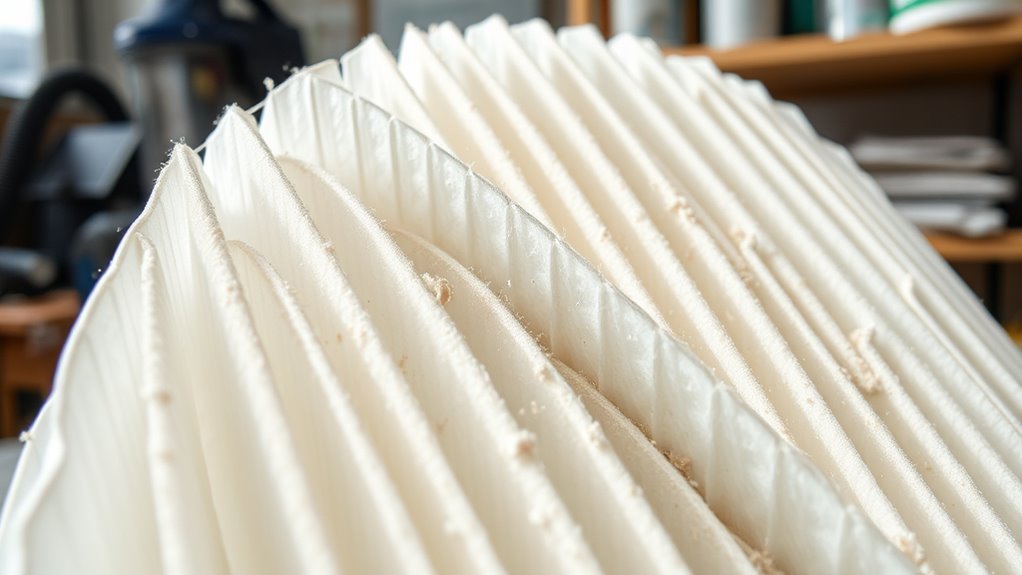
Assuming your HEPA filter will last forever without any maintenance is a common misconception that can lead to serious air quality issues. Over time, dust, allergens, and pollutants accumulate, reducing the filter’s effectiveness and shortening its lifespan. Without regular checks, you might think your filter is working perfectly, but decreased air quality could be a sign it’s clogged or nearing the end of its life. Neglecting maintenance allows contaminants to circulate freely, impacting your health and reducing the efficiency of your air purification system. To guarantee ideal air quality, you need to monitor your filter’s condition and perform timely maintenance. Remember, no filter lasts forever without care—regular upkeep is essential to maintain its performance and protect your indoor environment. Proper maintenance is also crucial for ensuring the filter continues to provide the benefits you expect.
Overlooking the Importance of Regular Replacement Schedules
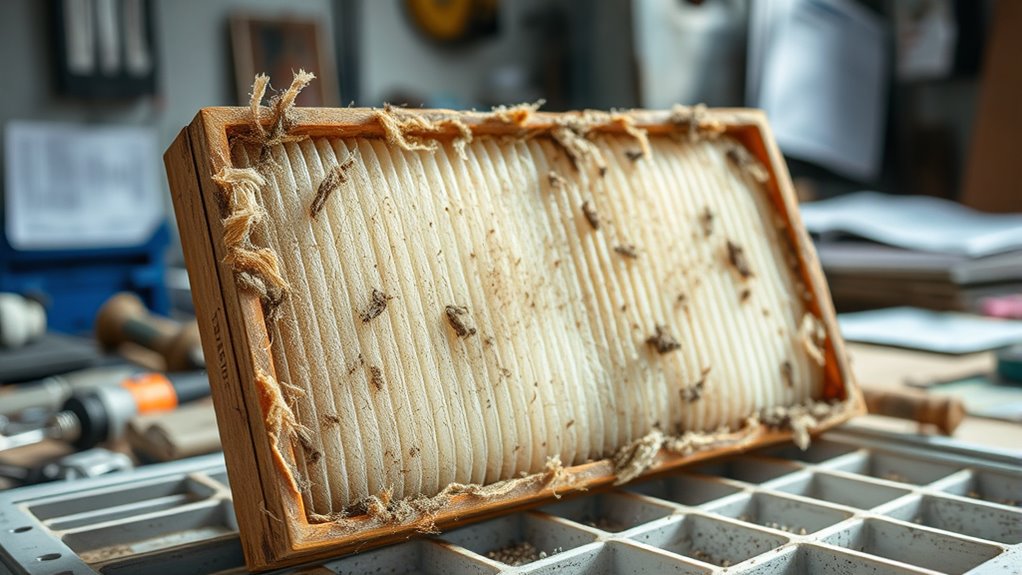
Neglecting to follow a regular replacement schedule for your HEPA filter can considerably compromise your indoor air quality. Over time, the filter’s lifespan diminishes as it traps more dust, allergens, and pollutants. Without consistent replacements, your filter becomes less effective, allowing harmful particles to circulate freely. Maintaining proper maintenance routines ensures you replace your HEPA filter before it reaches its capacity, maximizing its efficiency. Skipping scheduled replacements can lead to clogged filters that strain your HVAC system and reduce air purification. To avoid unnecessary costs and health risks, set reminders and follow manufacturer recommendations for filter changes. Regular replacements keep your air clean and your system operating smoothly, proving that attentive maintenance routines are essential for *superior* indoor air quality. Additionally, monitoring your filter’s filter indicator can help you determine the optimal time for replacement and prevent overuse.
Thinking Cleaning HEPA Filters Is Sufficient

Cleaning your HEPA filter might seem like enough to keep it functioning properly, but in reality, it often isn’t. Simply cleaning the filter material doesn’t eliminate all trapped particles or address the buildup that causes airflow restriction. Here’s why:
- Residual debris can clog the filter material, reducing efficiency.
- Cleaning methods may not fully remove microscopic contaminants.
- Reused filters can develop tears or damage, compromising their filtering ability.
- Airflow restriction increases, forcing your system to work harder and use more energy.
- Proper maintenance involves replacing filters when needed, not just cleaning them. This ensures ideal airflow and effective filtration.
Ignoring Signs That Indicate Filter Replacement
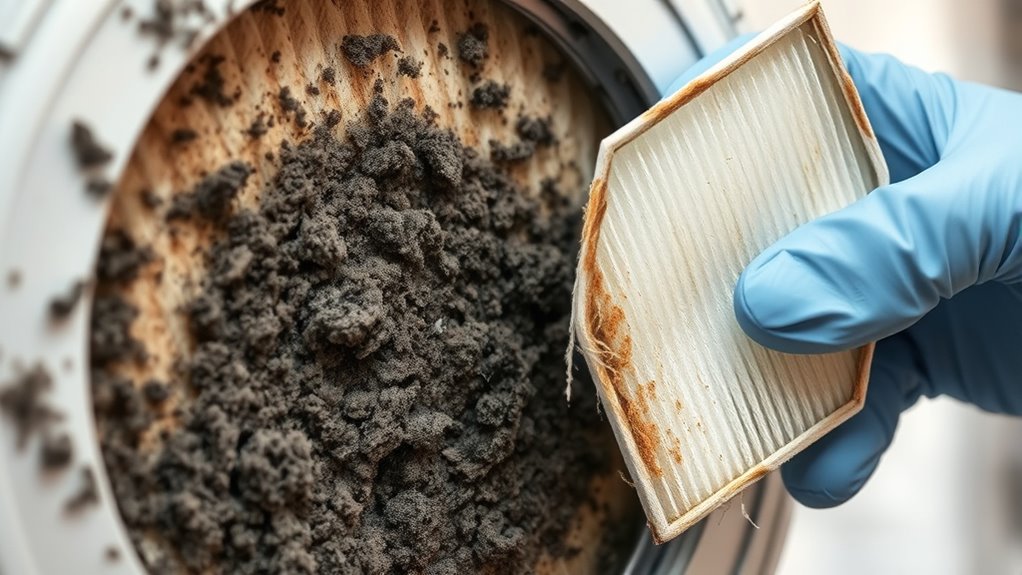
Even if you’ve cleaned your HEPA filter, it’s easy to overlook signs that it’s time for a replacement. The filter’s lifespan varies based on usage and maintenance frequency, and ignoring these cues can reduce efficiency and increase costs. Look out for decreased airflow, persistent odors, or dust buildup—these are clear signs your filter is no longer effective. Regularly inspecting your filter helps prevent unnecessary strain on your HVAC system. Additionally, understanding the filter lifespan can help you plan timely replacements and maintain optimal air quality.
Using the Same Filter for Too Long
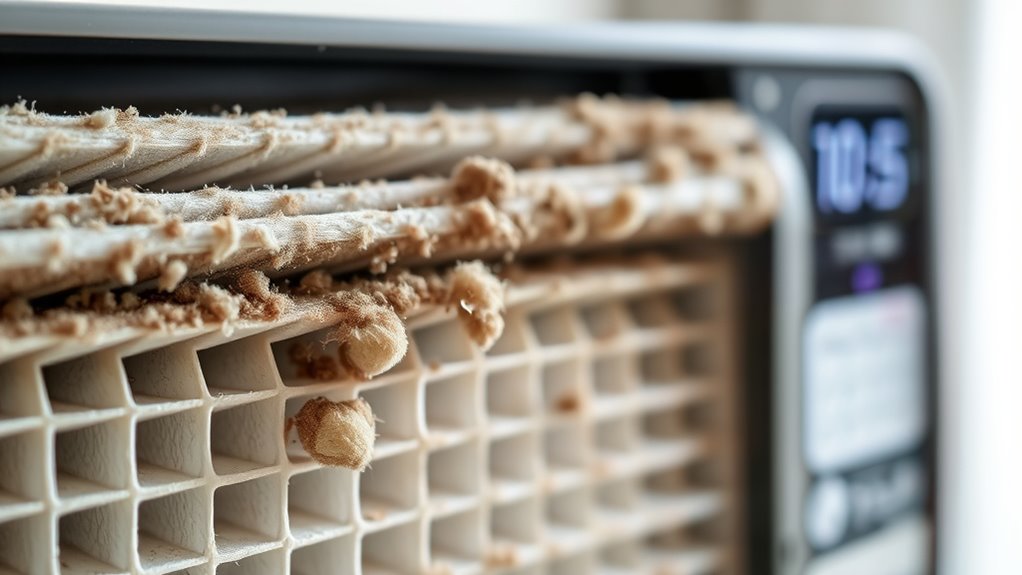
Using the same HEPA filter for too long can substantially reduce its effectiveness and compromise your indoor air quality. Over time, the filter’s lifespan diminishes, and reuse risks increase. Here’s why you should replace it regularly:
Using a HEPA filter too long reduces effectiveness and harms indoor air quality.
- Clogged filters block airflow, reducing filtration efficiency.
- Accumulated dirt and allergens diminish the filter’s ability to trap particles.
- Reduced airflow causes your HVAC system to work harder, increasing energy costs.
- Potential mold growth on a saturated filter can release spores into your indoor environment.
- Ignoring proper filter maintenance can exacerbate air pollution and health issues.
Waiting too long to replace your filter compromises its ability to clean the air effectively. Regular replacement guarantees ideal performance and minimizes health risks associated with reuse risks. Don’t risk your indoor air quality by neglecting filter lifespan guidelines.
Underestimating the Impact of Proper Storage and Handling
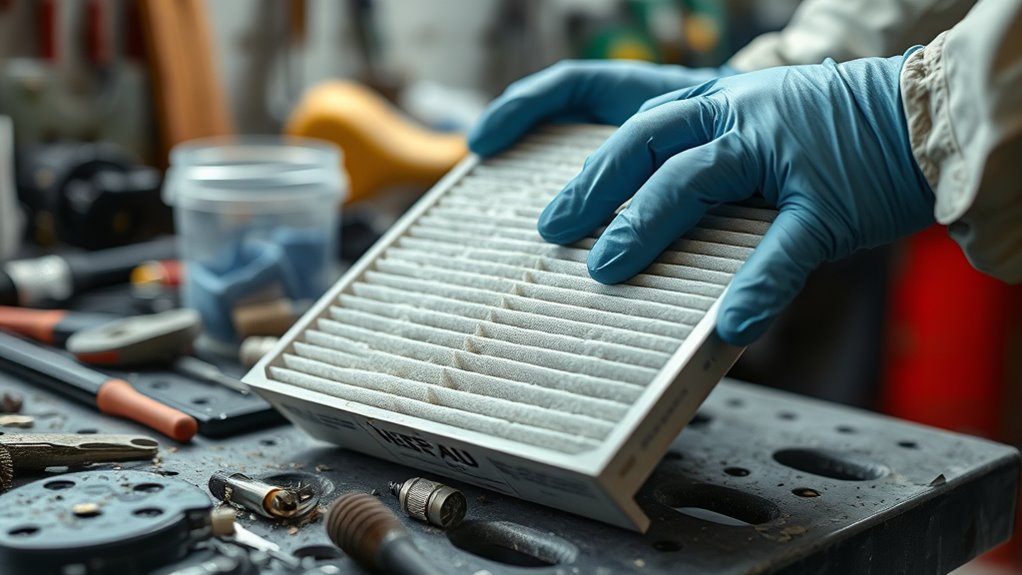
You might think storage and handling don’t matter, but they’re vital for filter performance. If you don’t keep filters in a dry environment or handle them carefully, their effectiveness can drop quickly. Proper storage and gentle handling ensure your filters stay in top shape when you need them. Using the right fabric decorating markers can also help maintain the integrity of labels or markings on the filters, preventing confusion or mishandling.
Store in Dry Environment
Proper storage and handling are vital to maintaining a HEPA filter’s effectiveness, yet many underestimate their importance. Storing your filter in a dry environment is essential for preserving its filter lifespan and peak performance. Moisture can damage the filter media and reduce its efficiency. To guarantee proper storage, keep these points in mind:
- Store filters in a cool, dry place away from humidity.
- Avoid places prone to leaks or water exposure.
- Keep filters in their original packaging until use.
- Do not store filters near chemicals or fumes that could compromise their integrity.
- Proper storage practices help prevent moisture damage and ensure the filter maintains its filtration capabilities.
Handle With Care
Even a small mishandling during storage can substantially reduce a HEPA filter’s effectiveness. Rough handling or improper techniques can damage the filter media, shortening its filter lifespan. Always handle filters gently, avoiding drops, crushing, or bending. Use clean gloves to prevent dirt transfer, and hold the filter by its frame, not the media itself. Proper handling techniques ensure the filter remains intact and performs at its best. Neglecting these precautions may lead to tears or deformation, which compromise filtration efficiency. Remember, a damaged filter will not only underperform but may also require premature replacement, costing you more money. Additionally, understanding the business implications of proper storage can help avoid unnecessary expenses and ensure optimal operation. Prioritize careful handling throughout the storage and installation process to maximize your filter’s lifespan and maintain indoor air quality without unnecessary expense.
Frequently Asked Questions
How Often Should I Technically Replace My HEPA Filter?
You’re probably wondering about your HEPA filter’s lifespan and replacement schedule. Typically, you should replace your filter every 6 to 12 months, but it depends on usage and environment. Regular checks help you catch buildup or reduced airflow early. Don’t rely solely on time; monitor filter condition to guarantee peak air quality. This way, you maintain effective filtration without unnecessary replacements, saving you money and ensuring cleaner air.
Can Improper Storage Damage HEPA Filters Over Time?
Improper storage can definitely cause storage damage to your HEPA filters over time. If you leave them in damp, dusty, or humid environments, the filters may degrade faster due to mold or particle accumulation. Poor storage conditions can compromise their effectiveness, leading to filter degradation. To prevent this, keep your filters in a clean, dry, and sealed container, ensuring they stay in good condition until you’re ready to use them.
Are There Specific Cleaning Methods That Harm HEPA Filters?
You should avoid using harsh cleaning chemicals or improper handling methods on HEPA filters, as these can damage the filter media and reduce effectiveness. Instead, gently vacuum or replace the filter as recommended by the manufacturer. Using incorrect cleaning techniques might seem helpful, but it can actually harm the filter’s ability to trap particles, leading to decreased air quality and potential health risks. Proper care keeps your filter working efficiently.
What Are Hidden Costs of Neglecting Proper HEPA Filter Maintenance?
Neglecting proper HEPA filter maintenance can lead to costly health risks, as clogged filters fail to trap harmful particles, risking your well-being. It also increases energy bills because your HVAC system works harder to circulate air through dirty filters. Over time, this can cause system damage and costly repairs. Regular maintenance ensures peak performance, saving you money and protecting your health in the long run.
How Do Environmental Factors Affect HEPA Filter Lifespan?
Environmental factors can be a double-edged sword for your HEPA filter’s lifespan, much like a garden thriving or wilting under different conditions. Poor air quality and high humidity can clog filters faster, reducing their efficiency. You need to monitor humidity levels and improve air quality to extend filter life. By controlling these factors, you guarantee your HEPA filter works effectively, saving you money and maintaining a healthier environment.
Conclusion
Don’t fall for the myths that HEPA filters last forever or never need replacing. While saving money now might seem wise, ignoring proper maintenance can cost you much more in health and repair bills later. Think of it this way: neglecting your filter is like ignoring a small leak—at first, minor, but eventually, it causes flooding. Stay vigilant, follow proper schedules, and treat your filters with care to truly protect your space and wallet.

